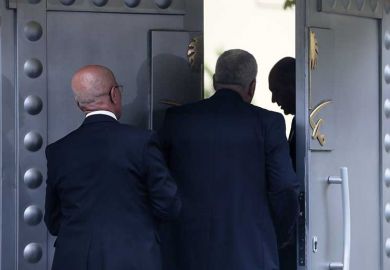The Massachusetts Institute of Technology, after four months of reflection following the killing of journalist Jamal Khashoggi, has decided against imposing any ban on financial and academic relations with Saudi Arabia.
MIT’s leadership, in a second internal study of the matter, reiterated its “deep sense of revulsion” over the killing of Mr Khashoggi but said it could not cancel faculty-led projects without broad faculty endorsement of its authority to do so.
MIT will, however, create a faculty committee to recommend if and when a situation – such as the Khashoggi killing – reaches that point.
Through that process, said MIT’s president, Rafael Reif, the MIT faculty will “tell us what it is that they want as principles of engagement for faculty at MIT to be”.
MIT’s position falls in line with similar responses to the killing of Mr Khashoggi, including by the US government, that have mixed words of disgust with a general reluctance to take punitive action against a leading global oil producer.
Mr Khashoggi, a Saudi national and author who had grown highly critical of his government, was killed on 2 October inside the Saudi consulate in Istanbul. US intelligence agencies concluded the killing was ordered by the de facto Saudi leader, Crown Prince Mohammed Bin Salman.
MIT, however, has had Saudi partnerships for decades, and the Khashoggi killing came just months after the crown prince visited MIT to talk with Professor Reif and other MIT leaders about expanding them. The ventures included a pledge from Saudi Aramco, the state-owned energy company, for $25 million (£19.3 million) over five years in research funding.
MIT currently has about $7 million in total sponsored research funding from Saudi sources, according to the study issued on 6 February by Richard Lester, MIT’s associate provost for international activities.
In that study, Professor Lester recommended no ban on Saudi relationships at MIT. The dollar values at stake were minor to MIT – about 0.2 per cent of its annual budget – and not a factor in any response to the Khashoggi killing, Professor Lester said in a summary report.
Instead, Professor Lester said in the report addressed to Professor Reif, MIT must seek clear instruction from MIT faculty as a whole before overriding the rights of individual faculty to establish outside partnerships. Professor Reif said he accepted the conclusions.
The report was a follow-up to one in early December that reached a similar conclusion, to broad protest across campus. For the new report, Professor Lester said he received 111 separate comments from the MIT community, including from 42 faculty members.
The majority of comments urged MIT to cut off financial ties to the Saudi government, Professor Lester acknowledged in an interview along with Professor Reif. Yet no MIT faculty with actual projects were willing to do that, and MIT has no institution-led projects that it solely controls, Professor Lester said.
“Many of us feel logically that we want to disengage” with a country such as Saudi Arabia, Professor Reif said. “At the same time, we have the issue of faculty autonomy.”
Professor Reif said MIT would be willing to work on a broader approach to Saudi Arabia with other universities, if it was asked to do so, but it first had to complete the process of establishing its own position. “We still are trying to figure out where are we on this,” he said.
“I don’t know that I view MIT as a thought leader on this issue,” the president said. “All I do know is that we have this engagement, and I thought it was good that we know exactly what we’re doing, and it was important that we have an answer to the concerns of people, and our concerns, our own anger at the whole situation.”
Register to continue
Why register?
- Registration is free and only takes a moment
- Once registered, you can read 3 articles a month
- Sign up for our newsletter
Subscribe
Or subscribe for unlimited access to:
- Unlimited access to news, views, insights & reviews
- Digital editions
- Digital access to THE’s university and college rankings analysis
Already registered or a current subscriber?








